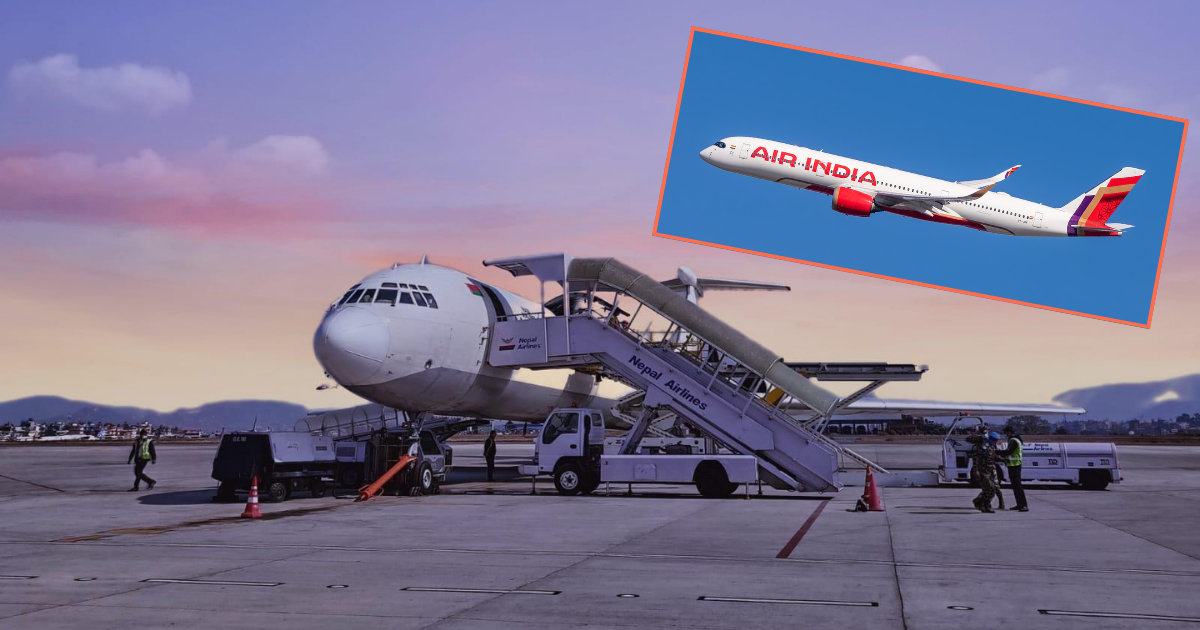Kathmandu: Air India is preparing to hand over the responsibility of self-ground handling, which it has been carrying out since starting operations in Nepal, to the national flag carrier Nepal Airlines Corporation (NAC).
Under this arrangement, Air India will take ground handling services directly from NAC, while only providing technical support.
The bilateral cooperation and agreement process between NAC and Air India regarding NAC providing ground handling services to Air India has reached its final stage.
According to NAC spokesperson Subas Dangol, Air India is now ready to hand over ground handling responsibility to NAC. For this, an agreement between the two airlines is required. While the agreement has not been finalized, Air India has already agreed to take the services provided by NAC.
Earlier, Thai Airways had also handed over its self-ground handling services to NAC following an agreement on 29 October 2023.
After NAC began providing ground services, Thai Airways transferred 80 units of ground support equipment to NAC. It is estimated that NAC’s annual business increased by Rs 3 billion from handling Thai Airways’ services.
Spokesperson Dangol stated that since NAC will be providing ground handling services to Air India and other international airlines, the revenue base will expand, and the corporation will become more reliable.
Currently, NAC earns around Rs 4 billion annually from ground handling services. With Thai Airways already included and additional international flights increasing, NAC expects revenue from ground handling to reach between Rs 4.5 to 5 billion this year.
However, the Civil Aviation Authority of Nepal (CAAN) and the government are working to draft an aviation policy that could strip NAC of its monopoly over ground handling services. NAC, meanwhile, argues that competition should be introduced only to ensure quality services, not to take away its long-held responsibility.
The draft aviation policy prepared by the Ministry of Tourism mentions making NAC’s monopolized ground handling services more qualitative and competitive by improving them over time. Once implemented, NAC’s monopoly on ground handling services could be removed.
Since its establishment, NAC has held a monopoly over ground handling services, which include transporting passengers and cargo between terminals and aircraft. Under the new arrangement, CAAN would hold the authority to take this right away from NAC.
So far, NAC employees have resisted repeated attempts by CAAN to take away its ground handling services under the name of competition.
Earlier, CAAN attempted to allow Himalaya Airlines to perform self-ground handling for its 35 weekly international flights from Nepal, but the plan failed due to NAC employees’ opposition.
NAC employees argue that granting self-ground handling permits would allow airlines to provide services independently, end NAC’s monopoly, and erode its business branch.
Government officials themselves have claimed that NAC, instead of focusing on making profits through flight operations, has over-relied on ground handling income, neglecting aviation safety, which has led the government to attempt to strip away its rights under the name of competition.
Officials also argue that NAC’s reliance on ground handling has prevented it from becoming competitive in aviation services.
In May 2024 (Jestha 2081), CAAN had already decided to allow competition in ground handling at Bhairahawa airport, with Himalaya Airlines, Buddha Air, Shree Airlines, and Yeti Airlines being included alongside NAC.



Comment Here